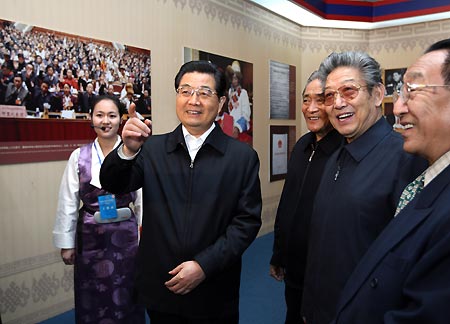Chinese Sphere: Tibetan Serfdom

Chinese President Hu Jintao visits an exhibition marking the 50th Anniversary of Democratic Reform in Tibet, at the Cultural Palace of Nationalities in Beijing. (Xinhua)
This year marks the 50th anniversary of the Tibetan uprising against Chinese Communist rule in the region. Throughout this month, the Chinese government has been imposing a lockdown in areas with large Tibetan populations and banning foreign journalists from those areas. Yesterday, seemingly in an attempt to negate the anniversary of the uprising and further solidify Chinese Communist party (CCP) rule over Tibet, the government designated March 28 to be Serfs’ Emancipation Day to commemorate the freeing of Tibetans from serfdom under the Dalai Lama. Here is the official view from China Daily:
More than 1 million serfs were freed in Tibet in 1959, eight years into the region's peaceful liberation and shortly after a failed uprising of its feudalistic upper class.Earlier, about 95 percent of Tibet's 1.14 million population were serfs, owning no more than 5 percent of the social resources. The local upper class, comprising only 5 percent of the region's population, ran a brutal, theocratic rule.
In January, Tibet's 382 legislators, mostly with a serf background, unanimously endorsed a bill, declaring March 28 as Serfs' Emancipation Day during the local people's congress' annual session in Lhasa.
A People’s Daily editorial calls this a triumph of “democratic reform:”
Democratic reform is yet another great contribution that the new China has made to the work of global human rights. The darkness and cruelty of the old Tibet was heartless and ruthless towards humanity and human dignity. The carving out of eyeballs, breaking of joints, cutting off of feet, and other cruel punishments inflicted upon serfs and slaves were absolutely horrifying. Democratic reform shattered the system which divided people into castes. It abolished the old Tibet’s laws and barbaric punishments. It liberated a million serfs and slaves from inhuman oppression. Through the national constitution and laws, it provided guarantees of dignity and rights accorded to citizens. From this time forth, a people’s democratic political system was established. The shackles that obstructed the democratic political development were utterly broken.
An editorial in Sing Tao Daily, the second largest newspaper in Hong Kong, does not see any hope for any forward movement in relations between the CCP and the Dalai Lama:
Beijing and the Dalai Lama’s representatives have not been able to make progress in talks. The root problem is that though the Dalai Lama does not insist upon Tibetan independence, his proposal for a high level of autonomy for a greater Tibetan region is difficult for Beijing to accept. The Dalai was born in Qinghai, and many of his protectors who fled with him are from Tibetan regions in Sichuan. The government-in-exile cannot ignore their interests. This greater Tibetan region encompasses a quarter of China’s territory. It is impractical to demand that Beijing make such a concession.
In an op-ed in the Apple Daily, one of the largest newspapers in Taiwan, former deputy secretary-general of Taiwan’s National Security Council Antonio Chiang sees the Chinese government’s handling of Tibet as ultimately harming the national interest:
The CCP’s hostility towards the Dalai Lama has deepened. Hope for reconciliation between the two sides has shattered. The situation has deteriorated and each side has become further radicalized. This is in no way beneficial for China’s peace and stability.There is an abundance of talent in the ranks of overseas Tibetans. Their experience in exile has trained them extremely well, especially in the areas of diplomacy, public relations, lobbying, and international organizations. They have also cultivated much talent in the political, cultural, and educational fields…
The Dalai Lama will not remain cooped up for the long-term in India’s northern mountainous regions. His habit of traveling around the world will not change. Wherever he goes, that country and China will experience very unpleasant tensions. This is an acute irony in China’s desire to cultivate the image of a great nation.
To the CCP, the Tibet issue is inextricably tied up with its notion of Chinese sovereignty. Practically speaking, if Tibetans were granted the autonomy that is called for by the Dalai Lama, how seriously would that compromise China’s national security? It is hard to imagine that India would seek to exploit Tibetan autonomy in order to advance territorial claims.
However, in the same way that the CCP has framed the issue of Taiwan and Xinjiang, they have all become part of a “national myth” of Chinese sovereignty and identity, and the CCP has staked its legitimacy upon nothing less than the maximalist goal of establishing its unchallenged rule over these areas. It is a high stakes zero-sum game, and anyone who deals with Beijing in these sensitive issues must be cognizant of this and plot his strategy accordingly.



